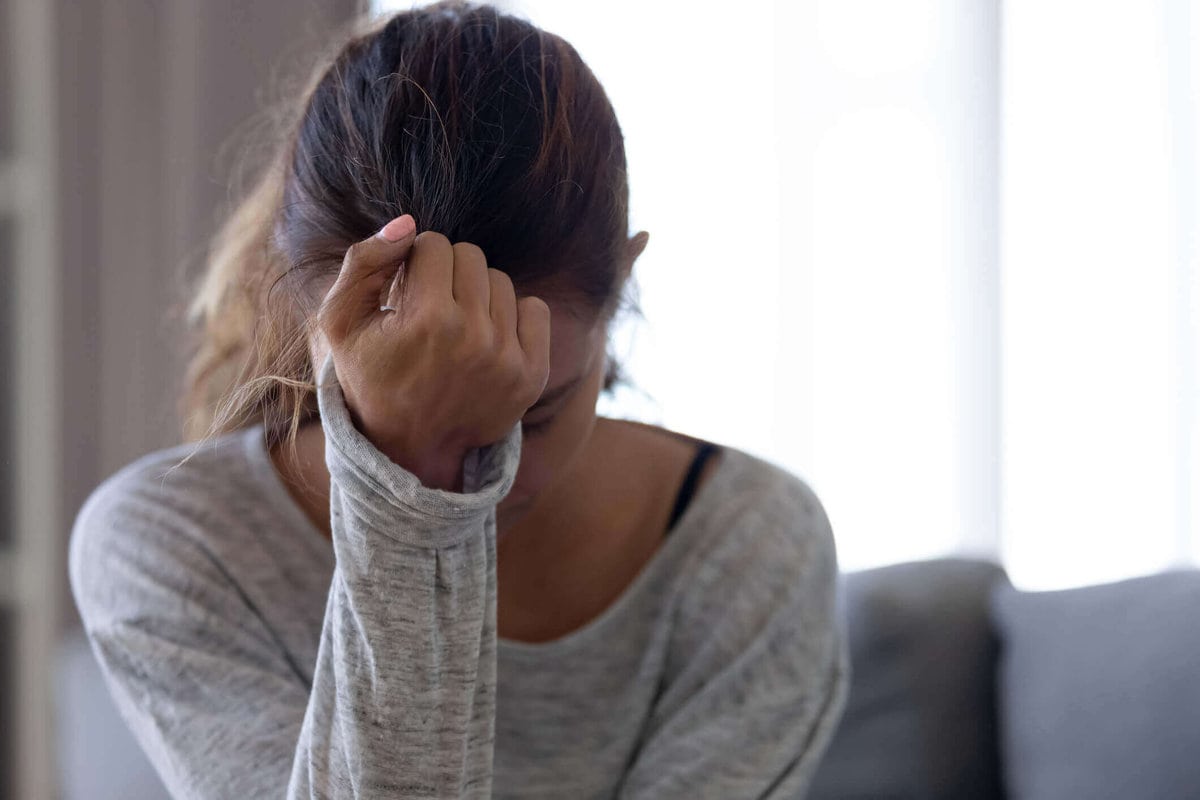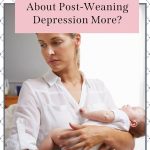For the first fourteen months of my daughter’s life, we shared a picture-perfect nursing relationship. She latched well, ate well, and, eventually, weaned well. With such a great experience behind us, I felt proud of our breastfeeding journey. But that’s also exactly when the post-weaning depression kicked in.
A couple of weeks after weaning entirely, I noticed that I was experiencing feelings of “edginess” and agitation. Eventually, those emotions evolved into sinking moments of sadness that left me constantly on the verge of tears.
I felt broken.
Sure, I’d dealt with the occasional bout of anxiety throughout my life, but this was different.
After speaking with my primary care physician and gynecologist, they eventually decided I was likely suffering from post-weaning anxiety and depression.
I was confused. I’d always heard of the baby blues and knew several people that had dealt with postpartum depression and/or postpartum anxiety, but post-weaning depression? It didn’t sound like a real thing.
All I’d done was finish nursing my baby; I felt overcome with questions about why this could be wreaking havoc on my mental health.
Shouldn’t I feel accomplished?
Shouldn’t I appreciate that my boobs finally belonged to me again?
Shouldn’t I be happy?
Sadly, I’m not alone in my worries and feelings about the connection between mental health and breastfeeding.
If you’ve recently weaned your baby and are struggling with intense emotions, it’s crucial to understand the ins and outs of post-weaning depression. While there’s an underwhelming amount of information on the topic, enough exists to prove this experience is real.

This site contains affiliate links, meaning that we earn a small commission for purchases made through our site. We only recommend products we personally use, love, or have thoroughly vetted.
- Can Weaning Cause Anxiety and Depression?
- What Are the Most Common Signs of Post-Weaning Depression?
- When Should You Talk to Your Doctor About Post-Weaning Anxiety & Depression?
- Finding the Right Post-Weaning Depression Treatment Options
- Will You Struggle with Post-Weaning Anxiety and Depression Every Pregnancy?
- Creating a Balance Between Mental Health and Breastfeeding
Can Weaning Cause Anxiety and Depression?
The short answer to “Can weaning cause anxiety and depression?” is “yes.”
While it’s not as prevalent as postpartum depression, post-weaning depression and anxiety are very much real things. But why? What is it about ending your breastfeeding experience that can throw your emotions into a tailspin?
Here are the top reasons you could end up suffering from post-weaning anxiety or depression:
Sadness About Your Baby Growing Up
There are many different reasons you might decide to stop breastfeeding, but some moms simply have a particular timeline for their nursing journey in mind.
Take me, for example; my goal was always to breastfeed for the first year of our children’s lives. Once I made it that year marker and began to wean slowly, it was a constant reminder that I didn’t have a tiny newborn anymore.
Coming to terms with your kids growing up isn’t always easy – especially if it’s your last child. There’s a good chance this could contribute to weaning depression.
Hormonal Changes
As if hormones haven’t already thrown your mental health for a loop during your postpartum recovery, you might be disappointed to learn they’ll come back into play after you wean your child.
While we’re nursing, our bodies produce hormones called prolactin and oxytocin. A side effect of these hormones is lovey-dovey, happy feelings.
However, as we begin the weaning process, these hormone levels will quickly drop off.
The sharp decline of these mood-boosting hormones can leave us feeling stressed, anxious, sad, and angry, among other things.

Fear of a Disconnect Between You and Your Baby
Studies prove that breastfeeding creates a better bond between moms and their babies. It’s not unusual for women to fear a disconnect between their little ones after their nursing relationship ends.
What Are the Most Common Signs of Post-Weaning Depression?
During my experience with post-weaning anxiety and depression, I had a hard time recognizing there was a problem.
As someone who’s dealt with periodic bouts of anxiety throughout my life, I tried to chalk my feelings up to the status quo. What began as slight feelings of discomfort and stress, however, quickly developed into something more serious.
It felt like I was spending my days in a fog.
I couldn’t concentrate, was forgetful, and constantly felt like I wanted to cry, even when nothing was “wrong.”
Since it started when my second daughter was on the delightful cusp of becoming an independent toddler, I blamed the situation on parenting two young children.
What I didn’t realize is that the symptoms I struggled with were connected to mental health and breastfeeding.
If you’re wondering whether you might be dealing with undiagnosed depression after weaning, be on the lookout for signs like these:
- Irritability
- Anxiousness
- Tearfulness
- Mood Swings
- Feeling Increasingly Sensitive
- Difficulty Focusing
- Decreased Motivation or Interest in Activities
- Guilty Feelings
When Should You Talk to Your Doctor About Post-Weaning Anxiety & Depression?
Temporary changes to your mental health immediately after weaning your little one are among the common negative effects of breastfeeding on moms.
The keyword here is “temporary.”
If these negative emotions and side effects last for more than a few weeks, it’s a good idea to make an appointment with your doctor. They can help you formulate a treatment plan to get your mental health back on track.
Just don’t wait too long to ask for help.
I kept assuming my post-weaning depression would subside on its own and waited several long months before seeking help. When I started treatment and realized feeling bad wasn’t normal, I was disappointed that it had taken me so long to talk to my doctors.
Finding the Right Post-Weaning Depression Treatment Options
When it comes to solving issues concerning mental health and breastfeeding, you might think there aren’t many treatment options available.
On the contrary, though, post-weaning anxiety and depression are genuine illnesses that come with the same solutions as many other mental health conditions.
Some of the most common post-weaning depression treatment options include:
- Anti-Depressant Medications
- Support Groups (Postpartum anxiety & depression support groups may be a good option if you can’t find a specific post-weaning depression group.)
- Counseling
- Acupuncture
Will You Struggle with Post-Weaning Anxiety and Depression Every Pregnancy?
I sometimes wonder if I would’ve suffered from post-weaning depression after my first daughter, would I have still decided to have another baby?
The experience was scary and not something I want to go through ever again.
However, there’s no guarantee you’ll struggle with weaning depression after every child.
While I was a little sad after weaning my first, the process was a success. My body and hormones returned to normal with no problems.
The most important thing to remember if you get pregnant after a battle with post-weaning anxiety or depression is to pay attention to your body.
Since you already have a history with the condition, look for any signs the problem is returning and get help as soon as possible.

Are There Ways to Prevent Post-Weaning Depression?
If you’ve been through this negative effect of breastfeeding on mom before, you might wonder whether there are ways to prevent weaning depression from happening again in the future.
While there’s no surefire way to eliminate your chances of developing post-weaning anxiety and depression, weaning slowly can be helpful. Instead of stopping “cold turkey,” by weaning your baby over longer periods, you can reduce the chances of a sharp drop in hormone levels that could cause depression to start.
Creating a Balance Between Mental Health and Breastfeeding
If there’s one thing I’ve learned since battling post-weaning depression is how little most new moms know about it.
A friend of mine recently weaned her daughter and casually brought up in conversation how strange she’d been feeling ever since. Mood swings and weepiness were becoming a part of her everyday routine, and she wasn’t sure why.
I told her about my struggle, and she was shocked to learn that yes, in fact, post-weaning anxiety and depression are a thing that many women struggle with.
If you’re thinking about ending your nursing or exclusively pumping journey, please be aware of this negative side effect of breastfeeding on mom.
Yes, weaning can cause anxiety, depression, and more. Thankfully, though, solutions exist when you know you need to look for them!
Have you ever dealt with post-weaning depression or know someone who has?











